Dive Details
Location
Date
Saturday 1 June 2019
Time
1:44pm - 3:15pm
Seas
Very surgy
Visibility
1 to 2 metres
Duration
90 minutes
Surface interval
Maximum depth
13.3 m
Average depth
9.4 m
Water temperature
17.9°C
Dive Profile from Citizen Hyper Aqualand
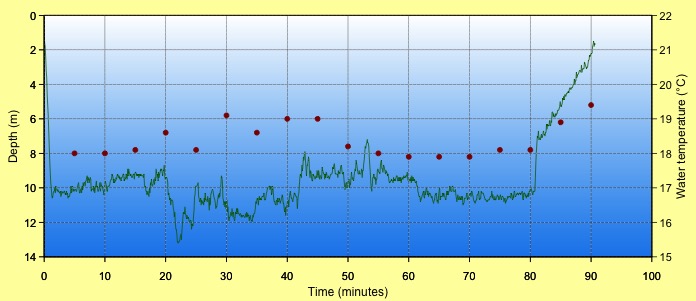
Tides at Botany Bay AEST
Note that tides at dive site may vary from above location.
Low
12:42am
0.59m
High
6:32am
1.48m
Low
12:32pm
0.51m
High
7:00pm
1.76m
Details
There was a big low pressure system off the coast of NSW that was going to cause huge seas on Tuesday. The swell had already come up and the forecast today was for a 2 to 4 metre southerly swell. Often Kurnell is unaffected by a southerly swells so I chanced it. I had a look at The Steps and while there were no large waves hitting the entry/exit, it was a like a washing machine and the water looked brown. I wasn't going to dive there. I'd come all this way so I decided to give The Monument a go. The Monument was not looking much better but at least I'd be able to get in and out more safely.
I walked out on the point but because the tide was still quite low it was rather exposed. I could have gone out through the channel but the occasional large wave made that a but risky. I ended up walking out on the western side of the point and then swam out on the surface some ways before descending. The visibility was less than 2 metres so I used my compass and headed north until I got to the wall. I dropped down the wall and then headed to the sand line. The visibility did not improve and there was quite a bit of surge. The water temperature was between 18 and 19°C.
I recognised a group of sponges and realised I was in the area where "Naomi", the White's seahorse, hangs out. I moved on to her usual rock and found her in her usual sponge. I was quite pleased with finding her as I was expecting to see very little with the visibility the way it was.
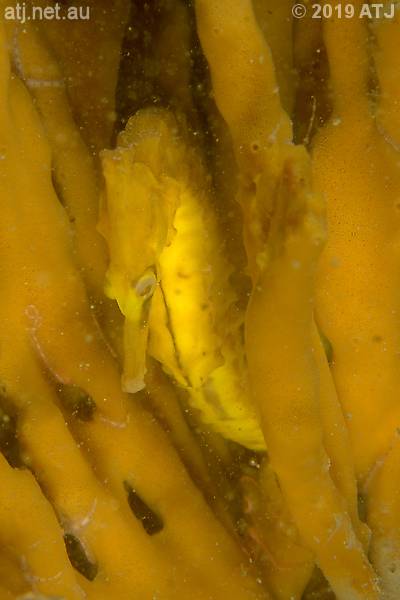
Female White's Seahorse, Hippocampus whitei, ("Naomi"). 10.4m.
I headed along the sand line at the base of the East-West Wall. As I went I moved slowly closer to the wall. I wanted to be able to find the ledge near the end of the wall. I start to recognise some of the Carijoa covered rocks and finally navigated my way to the ledge. Last time I was here I spotted a pygmy pipehorse and Cody and found some more here a week later. Looking for pygmy pipehorses was not easy as the surge was strong. I eventually spotted a cryptic female. I took some photographs which was not easy due to the surge. I looked for other pygmies but could not find any.
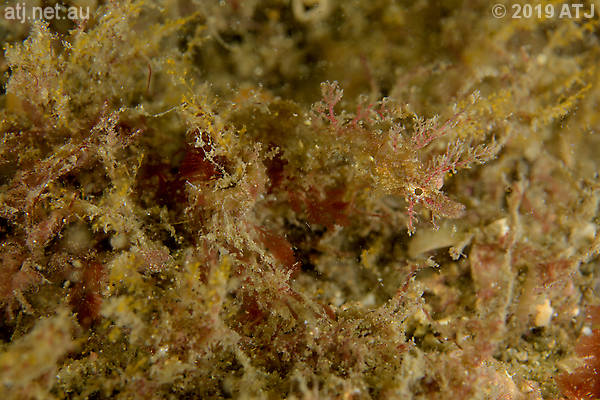
Female Sydney Pygmy Pipehorse, Idiotropiscis lumnitzeri, (IL2019060101). 9.2m.
I continued on to the large Carijoa covered rock. I looked for anglerfish on the side of the rock but found none.
I headed straight over the corner and started down towards the NW-SE Wall. As I descended the surge decreased but the visibility dropped to less than a metre. I came back up and swam along the top of the wall where the visibility was 1 to 2 metres.
I continued along the top of the wall until I came to the area where the grey Red-fingered Anglerfish had been and the hole where I'd last seen it. This was also the hole where I'd seen it mating. I swam down to the hole but it was empty.
I decided I would go along the reef as far as Split Rock before turning and heading back. I swam along the reef and was surprised to spot a small orange Red-fingered Anglerfish. I was so pleased to find an anglerfish with the terrible visibility. Unfortunately, the poor visibility meant that I couldn't work out what rock it was on.
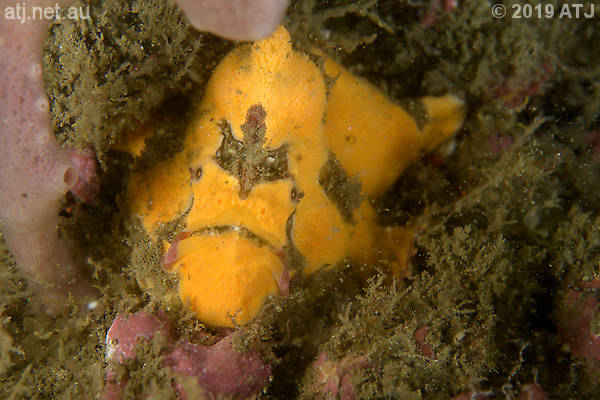
Red-fingered Anglerfish, Porophryne erythrodactylus. 11.6m.
I continued on to Split Rock which I only recognised because I saw the large cauliflower coral. I looked over Split Rock for the small orange Red-fingered Anglerfish I'd seen here the last two dives. I couldn't find it and wondered if the one I'd found earlier was the same one.
I turned and headed back along the reef. I was trying to find the anglerfish I'd found on my way earlier when I found another one. I couldn't be sure if it was the one I'd just seen but it was hiding in algae so I was confident it was a second one.
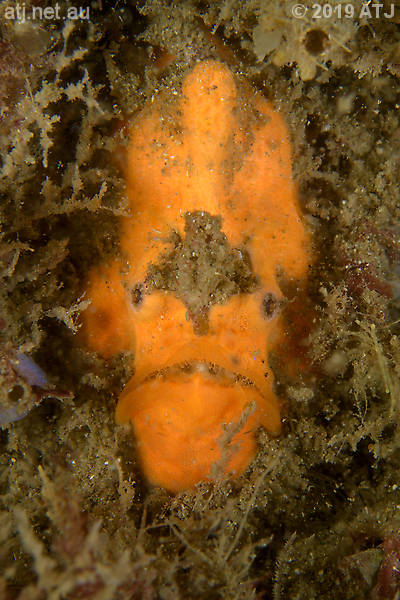
Red-fingered Anglerfish, Porophryne erythrodactylus. 10.9m.
I headed back to the hole where the grey anglerfish had been and then swam to the top of the wall. I followed the top of the wall for a while before swimming out over the reef. I followed one of the ledges and came across another orange Red-fingered Anglerfish. That's three for one dive. I would have been happy with that had the visibility been good.
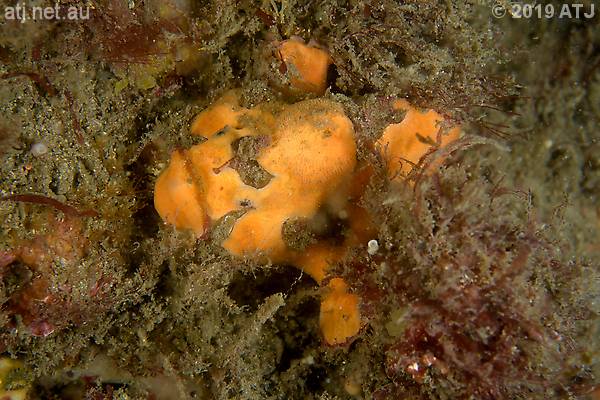
Red-fingered Anglerfish, Porophryne erythrodactylus. 9.3m.
I swam to the rock but with the visibility I couldn't be sure where I was. I had to use my compass to find my way back to the ledge. I looked on the ledge where I had seen the pygmy before but it was no longer there. I then spotted a pygmy in the Carijoa. I think it was the same female from earlier.
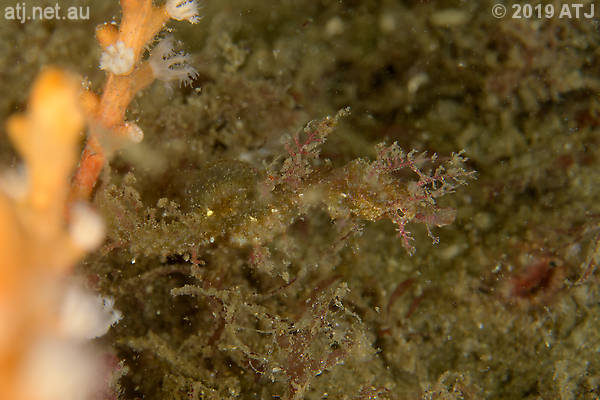
Female Sydney Pygmy Pipehorse, Idiotropiscis lumnitzeri, (IL2019060101). 9.5m.
I headed along the sand line below the East-West Wall. I wanted to find "Naomi" again. I came to her rock and she was still in her usual sponge.
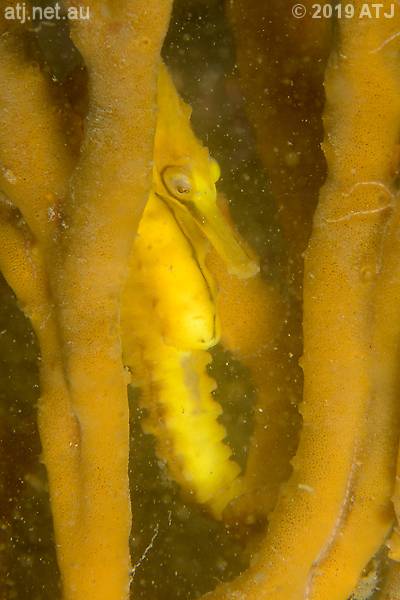
Female White's Seahorse, Hippocampus whitei, ("Naomi"). 10.5m.
I continued along the base of the wall. I stopped at the rock where Mandy's pygmies had been. I looked carefully on the rock for pygmies but found none.
I followed the base of the wall to the basket star - or at least that was my intention. I think I found the rock with the orange sponge where the basket star had been. The sponge was torn and there was no basket star.
I ascended the wall and swam south to the beach. I did my safety stop as I swam. Once the water got too shallow I stood up and waded out.
Camera gear
Camera
Nikon D500
Lens
Nikon AF-S Micro Nikkor 60mm f/2.8G ED
Housing
Ikelite 6812.5
Lens port
Ikelite Flat Port 5502.41
Strobe(s)
2 x Ikelite SubStrobe DS161